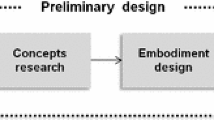Abstract
To increase user satisfaction index and achieve rapid innovation in new ergonomic product development, a multidisciplinary model integrating method of User-Centered Design (UCD) and theory of innovation problem solving (TRIZ) eight evolutionary patterns for ergonomic product innovative design in the early design stages was proposed. The integrated model and the approach procedures consists three steps. In step 1, three ergonomic needs dimensions integrated with UCD are utilized for identifying thorough user needs (UNs). And 5-point liner numeric rating scale is used for establish the relative importance of UNs. The internal consistency reliability of UNs is tested with Cronbach’s coefficient alpha statistic. Then the final UNs is established as well as the UNs priority. In step 2, the Eight Patterns of Evolution of the TRIZ are selected to generate design idea, with the UNs priority. In step 3, innovative design alternative is generated by using design idea together with the ergonomic design principles. Finally, a case study of the electric moxibustion device innovative design is conducted to demonstrate the feasibility of the proposed model and approach.
Access this chapter
Tax calculation will be finalised at checkout
Purchases are for personal use only
Similar content being viewed by others
References
Chammas, A., Quaresma, M., Alvão, C.M.: A closer look on the user centred design. In: 6th International Conference on Applied Human Factors and Ergonomics and the Affiliated Conferences, AHFE 2015, pp. 5397–5404 (2015)
Altshuller, G.S.: Creativity As an Exact Science. The Theory of the Solution Inventive Problems. Gordon and Breach Science Publishing, New York (1984)
Wang, C.: Using the theory of inventive problem solving to brainstorm innovative ideas for assessing varieties of phone-cameras. Comput. Ind. Eng. 85, 227–234 (2015)
Russo, D., Regazzoni, D., Montecchi, T.: Eco-design with TRIZ laws of evolution. Proc. Eng. 9, 311–322 (2011)
Labouriau, F.C.: Using the evolutionary pattern to generate ideas in new product development. J. Braz. Soc. Mech. Sci. Eng. 37(1), 1678–5878 (2015)
Solomani, C., Hua, Z.S., Shi, Q., et al.: TRIZ technology forecasting as QFD input within the NPD activity. Chin. J. Mech. Eng. 17, 284–287 (2004)
Wang, F.K., Yeh, C.T., Chu, T.P.: Using the design for six sigma approach with TRIZ for new product development. Comput. Ind. Eng. 98, 522–530 (2016)
Vinodh, S., Kamala, V., Jayakrishna, K.: Integration of ECQFD, TRIZ, and AHP for innovative and sustainable product development. Appl. Math. Model. 38, 2758–2770 (2014)
Rahimi, N., Ibarra, M.: A review of multiple user center design methods for new product development in smart and connected health applications. In: Portland International Conference on Management of Engineering and Technology, pp. 3498–3510 (2014)
Vermeulen, J., Verwey, R., Hochstenbach, L.M.J.: Experiences of multidisciplinary development team members during user-centered design of telecare products and services: a qualitative study. J. Med. Internet Res. 16, 238–248 (2015)
Pelt, A.V., Hey, J.: Using TRIZ and human-centered design for consumer product development. Proc. Eng. 9, 688–693 (2011)
Seva, R.R., Gosiaco, K.G.T., Santos, M.C.E.D., et al.: Product design enhancement using apparent usability and affective quality. Appl. Ergon. 42, 511–517 (2011)
Acknowledgements
The authors would like to thank the China Scholarship Council under Grant No. 201607815008 and Yanshan University Doctoral Fund Project under Grant No. B958. The authors really appreciate the help of NS State University Ergonomics and Design Laboratory. Last but not the least, many sincere thanks also go to the anonymous referees for their helpful advice.
Author information
Authors and Affiliations
Corresponding author
Editor information
Editors and Affiliations
Rights and permissions
Copyright information
© 2018 Springer International Publishing AG
About this paper
Cite this paper
Zhang, F., Joines, S. (2018). User-Centered Design and Theory of Innovation: Problem Solving Integration Approach for Ergonomic Product Design. In: Rebelo, F., Soares, M. (eds) Advances in Ergonomics in Design. AHFE 2017. Advances in Intelligent Systems and Computing, vol 588. Springer, Cham. https://doi.org/10.1007/978-3-319-60582-1_31
Download citation
DOI: https://doi.org/10.1007/978-3-319-60582-1_31
Published:
Publisher Name: Springer, Cham
Print ISBN: 978-3-319-60581-4
Online ISBN: 978-3-319-60582-1
eBook Packages: EngineeringEngineering (R0)




